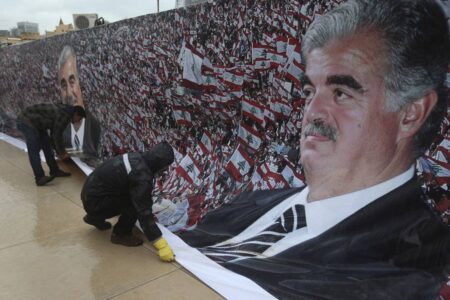
Hezbollah member convicted and three others are acquitted by tribunal in Lebanese Prime Minister assassination
A United Nations-backed tribunal on Tuesday convicted a Hezbollah member of conspiracy to kill former Lebanese Prime Minister Rafik al-Hariri in a 2005 bombing that set the stage for years of confrontation between Lebanon’s rival political forces.
There was insufficient evidence against three other men charged as accomplices in the bombing and they were acquitted, the tribunal found.
Judges said they were “satisfied beyond a reasonable doubt” that the evidence showed that the main defendant, Salim Jamil Ayyash, possessed “one of six mobiles used by the assassination team” and ruled he was guilty of committing a terrorist attack and of homicide.
“The evidence also established that Mr. Ayyash had affiliation with Hezbollah,” said Judge Micheline Braidy, reading a summary of the 2,600-page verdict.
The three other defendants — Hassan Habib Merhi, Assad Hassan Sabra and Hussein Hassan Oneissi — are also alleged members of the Iran-backed Shia Muslim group. All of the men were being tried in absentia.
Judges said they had however found no evidence that the leadership of Hezbollah or the Syrian government had played a part in the attack that left 21 others dead. Hezbollah has denied any involvement in the Feb. 14, 2005 bombing.
“The trial chamber is of the view that Syria and Hezbollah may have had motives to eliminate Mr. Hariri and his political allies, however, there is no evidence that the Hezbollah leadership had any involvement in Mr. Hariri’s murder and there is no direct evidence of Syrian involvement,” Judge David Re said earlier.
The verdict comes as the Lebanese people are still reeling from the aftermath of a huge explosion in Beirut that killed 178 people this month and from a devastating economic meltdown.
Hariri, a Sunni Muslim billionaire, had close ties with the United States, Western and Sunni Gulf Arab allies, and was seen as a threat to Iranian and Syrian influence in Lebanon. He led efforts to rebuild Beirut following the 1975-1990 civil war.
Hariri’s assassination plunged Lebanon into what was then its worst crisis since the war, setting the stage for years of confrontation between rival political forces.
Even before judges began reading their 2,600-page verdict into Hariri’s killing, Lebanon’s an-Nahar daily newspaper ran a headline: “International Justice Defeats Intimidation.”
The paper published a caricature of Hariri’s face looking at a mushroom cloud over the devastated city, with a caption: “May you also [get justice],” referring to an investigation that could unveil the cause of the blast.
Hezbollah leader Sayyed Hassan Nasrallah said on Friday he was not concerned with the trial and that if any members of the group were convicted, it would stand by their innocence.
Hezbollah’s Al Manar TV and the pro-Damascus Al Mayadeen channel did not cover the trial, which other broadcasters in Lebanon were airing live.
Beirut tour guide Nada Nammour, 54, speaking before the reading of the verdict began, said the 2005 bombing was a crime that should be punished. “Lebanon needs to see law and justice.”
The verdict in The Hague may further polarize the already divided country and complicate an already tumultuous situation after the Aug. 4 blast at Beirut port, where authorities say ammonium nitrate stored unsafely detonated, fuelling public outrage and leading to the government’s resignation.
Hariri’s killing removed a powerful Sunni leader and allowed the further political expansion of Shia power led by Hezbollah and its allies in Lebanon.
Source: CBC News





